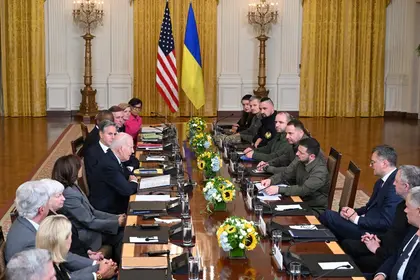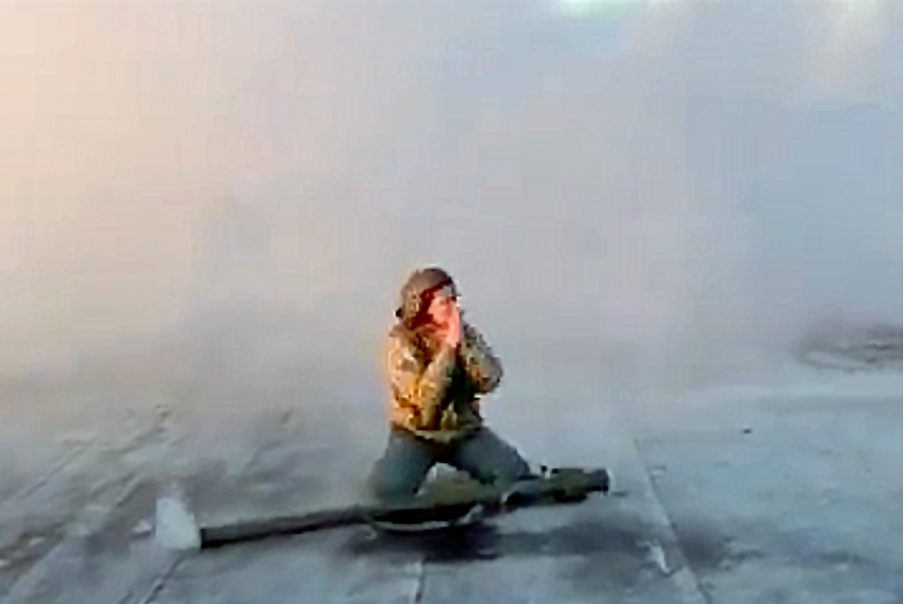Ukraine's allies are beginning to show an indifference to the fate of that country. This needs to be remedied but should not be surprising.
It's a slough.
JOIN US ON TELEGRAM
Follow our coverage of the war on the @Kyivpost_official.
The US public struggles to grasp the scale of the conflict. Americans have come to expect the US to crush its adversaries in a matter of weeks without material sacrifice or anguish for the country as a whole. Such was the case with the first and second Gulf wars, the invasion of Afghanistan, and various smaller conflicts spanning the last forty years. The Israelis are mopping up Hamas in just such a style.
Ukraine is different. By population, Russia remains by far the largest country in Europe and, despite its incompetence on the field, can still muster a large army with a vast, if unimpressive, array of weaponry. The battlefield in Ukraine has come to resemble the fronts of World War I, where vast sacrifices of men and materiel yielded minimal changes on the ground. The conflict has devolved into a monotony of death, where 1,000 casualties per day are no longer newsworthy and footage of tanks and artillery exploding have become just more of the same.
Under the circumstances, the average American wants it all to end. That's particularly true of a war in a faraway country with its own checkered past.
It's the economy, stupid! (Sort of.)
The reluctance of the US and European public is not just a matter of emotions. A recent Bankrate survey shows that, by a margin of 2-to-1, employed Americans feel that their wages are not keeping up with inflation. Thus, despite robust recent GDP growth and near full employment in the US, Americans are largely unhappy with the economy. Although funding the Ukraine war is not material in the overall US economic picture, it nevertheless represents to many an extravagant outlay on a discretionary war at a time when they feel their own budgets are pinched.

ISW Russian Offensive Campaign Assessment, November, 19, 2024
The public mood is affecting the political landscape. An NBC News poll from September found the GOP advantage on the economy to be the highest recorded in more than three decades of NBC News polling. Ukraine funding is part of that, and it is affecting the attitude of political leadership.
Isolationism
Finally, the US has traditionally had a strong isolationist streak. For example, as late as September 1940 -- a year after the fall of Poland, after the capitulation of France and well into the Battle of Britain -- only a bare 52% of Americans believed the United States ought to risk war with Germany to help the British. Britain and France are far closer to Americans' hearts than Ukraine will ever be, and yet Americans were all but unwilling to lift a finger to help our core European allies before Pearl Harbor ended the debate.
All these factors matter in the US. They need not paralyze policy, but they need to be understood, respected and addressed.
Biden needs to lead
The war in Ukraine is attributable to a failure of deterrence by the Biden administration. The disastrous pullout from Afghanistan marked President Biden as a weak leader and encouraged President Putin to try his hand at Ukraine.
When Biden declined to deter Russia with promises of direct military assistance to Ukraine, Putin again felt he had a green light to invade. Only when public opinion nevertheless demanded that the US government support Ukraine did the Biden administration take a stand, but even then, slow-played the provision of arms and other support, allowing the Russians to entrench and deliver the stalemate which now prevails. In addition, the on-going vacillation in US policy fuels the current Russian onslaught in Ukraine.
If the Republicans are reluctant to fund the war, well, President Biden has given them leeway to do so. Instead, the President should stand up and declare that the US intends to see the war through to victory. If the Republicans want to champion a loss in Ukraine, let them own it. If Republicans want to run on 'I'm the guy who lost to the Russians', let them run on it.
The Republicans are rapidly getting used to losing elections they should win. But if the President thinks vacillation will win him political support, it won't. It will only reinforce a view of him as a weak leader. Biden needs to stand up and clearly declare that the US is playing to win.
The Republicans need to get serious
On the face of it. Ukraine's position vis-à-vis Russia looks dire. The IMF estimates Ukraine's GDP, as measured in current US dollars, to be only 9% that of Russia, and the situation is not expected to change materially in the future. As a result, Russia can afford to spend more on the war. A lot more. Russia's planned 2024 military expenditure more than doubles from pre-war levels to $109 bn for 2024. This is more than Ukraine's entire GDP. Barring a reform of the Price Cap, Russia can sustain this level of spending indefinitely. Without external support, Ukraine's long-term position looks dire indeed.
However, the matter looks quite different in the broader context. While Russia's economy is large compared to Ukraine's, it is chump change compared to the US economy, which is 14 times larger as measured by current US dollar GDP. The comparison is even more ridiculous if Ukraine's broader set of allies is included, which together with the US, have a GDP 27 times that of Russia. The notion that the US and Europe are somehow unable to keep pace with Russian military spending is absurd on the face of it. This is the equivalent of a 270 lb. man being afraid of a 10 lb. child. Indeed, the IMF projects the US economy to add the equivalent of two Russias to 2028.
The question is whether Republican leadership intends to lose to a Russia which qualifies not as the high school varsity team, not as the junior varsity, but as the eighth-grade pick-up team. Does House Speaker Johnson really intend to be remembered as the guy who lost to the eighth graders? One would hope not. It's time to stop fooling around and get back in the game.
None of this should be construed as antipathy to many Republican objectives, including accountability for Ukraine funding and reinstating border control. No one has garnered more coverage in the right media than I have regarding the border, and no one has been more critical of administration border policy than I have. Notwithstanding, it's time to stop fooling around with Ukraine's funding.
Beating the Russians
Beating the Russians requires men, money and materiel. Of these, money is arguably the most important, for it buys men and materiel. A key means to beat the Russians, therefore, is to have more money, and that involves contributing more of one's own and taking the Russians' money away.
Russia's defense spending, as noted above, more than doubles its pre-war level to $109 bn in 2024, versus $48.2 bn in 2021. The pre-war budget was funded by Russian oil export prices averaging $56 / barrel from 2015 to 2021. The Russians are budgeting Urals at $71 / barrel for 2024, which, augmented by a higher ESPO price, provides an incremental $48 bn for the Russian government in 2024 and thereby funds the lion's share of Moscow's surge in military spending.
Of this, more than $30 bn can be seized from the Russians, even at today's low Brent and Urals price. Once Russian oil revenues are redirected to Ukraine, the entire calculus changes for Moscow. Its available resources will be trimmed, requiring deeper spending cuts to social programs or higher inflation, or both. Add to that 1,000 eliminated Russians every day, and the war will prove untenable over time, even as the funding support from the US and other allies remains tolerable from the perspective of domestic politics.
As a conceptual matter, beating Russia is not particularly hard. We have a bigger stack of chips at the poker table. A much, much bigger stack. With a bigger stack, our strategy comes down to a predictable call-and-raise. Whatever the Russians put in, we put in more. And if we want to save money, we reach across the table and take the Russians chips away from them.
Right now, we need policy that is steady and confident, with the awareness that we are the big boy at the table. It will still be a long war, but we can easily regain the upper hand.
Steven Kopits heads Princeton Policy Advisors. A strategic management consultant and investment banker, he writes frequently on policy topics for a variety of publications, including Foreign Policy and The National Interest, and is a regular contributor to CNBC and The Hill.
This article is reprinted from Princeton Policy Blog. See the original here.
The views expressed in this opinion article are the author’s and not necessarily those of Kyiv Post.
You can also highlight the text and press Ctrl + Enter









